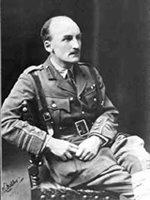Military Thoughts VII.

This is coolbert:
Now to J.F.C. Fuller.
British military officer before and after World War One [WW1].
Had a distinguished record during that conflict. Was a controversial and acerbic writer in the years after the war as well. Was retired early in his career after reaching the rank of Major General. Did not participate in World War Two [WW2] as it was decided he had definite fascist tendencies. His lack of participation was probably to the detriment of the British.
From De Gaulle:
"But what about your best soldier, General Fuller? He was our prophet, we only followed him . . . You will find prophesized in his books everything the Germans did with tanks. I have often wondered why he is not used."
Considered to be the greatest military historian and analyst of military affairs in the Twentieth Century [according to Du Puy].
The one man who made the greatest strides in military theory since the time of Clausewitz and Jomini.
The main contribution made by Fuller was to enumerate and enunciate the principles of war.
Prior to Fuller, officers and persons aspiring to command were told to study the principles of war. But no one could agree as to what those principles were, much less to make a list of them.
Only during a period of preparation for a general European war which he felt was at hand did Fuller discover that NO list of the basic principles of war existed.
"British officers should understand 'the fundamental principles of war [which] are neither very numerous nor in themselves very abtruse.'"
As I have said, no such list of the fundamental principles existed. NO list was enumerated or agreed upon. It was up to each officer to decide for himself what was relevant and what was not.
Fuller, after intensive study of the campaigns of Napoleon, did arrive at a list of principles he felt were instrumental to the success of the Emperor.
[Fuller probably followed a regimen of study that was similar to what Napoleon did over one hundred years earlier. Study the military campaigns of the "great Captains". Find out what contributed to their success. And when there was failure, find out why there was failure. An understanding of reasons for and against success will inevitably lead to the principles as enunciated by Fuller.]
These were:
* Objective.
* Mass.
* Offensive.
* Surprise.
* Security.
* Movement.
* Economy of Force.
* Cooperation.
The British Army, in the years after WW1, adopted these principles "in toto" as their standard.
The American Army did also, with two modifications. Substituting the word MANEUVER for movement and adding SIMPLICITY and UNITY OF COMMAND for cooperation. Both these changes seem to be valid and are merited. The word maneuver being to use movement [mobility] to gain an advantage. Cooperation=Simplicity + Unity of Command also worthy.
It must also be noted that Fuller, WAS NOT able to codify a military theory as he would have liked.
"Fuller knew that there should be more content and more scientific rigor to a theory of combat [military theory] than just the Principles of War, but he never quite succeeded in formulating such a theory."
Also, keep in mind the admonitions of the friendly but bemused British Sergeant Major when observing Cadet Bill Slim [later to become a senior British commander in WW2] attempting to do exactly what Fuller was doing at the same time during WW1, namely, discover what the principles of war were. According to the British Sergeant Major, the basics of war boiled down to:
"Hit the other guy as hard as you can, as fast as you can, where it hurts him the most, and when he ain't lookin'".
Well, can someone suggest something better??!!
coolbert.
Labels: Theory

1 Comments:
I think there are no laws of warfare because there are just so many variables that the ability to size things up in the moment and react accordingly far outweighs any theory a clever theorist can come up with. Kind of like why business school is so short on theory and so long on case studies.
With law, it's different because you're dealing with outcomes in an artificially created system. With physics, the systems are much simpler (one ball flying through space) so you can predict a lot more a priori. But war is thousands of people trying to kill thousands of other people. It's really hard to predict.
5:21 PM
Post a Comment
Subscribe to Post Comments [Atom]
<< Home